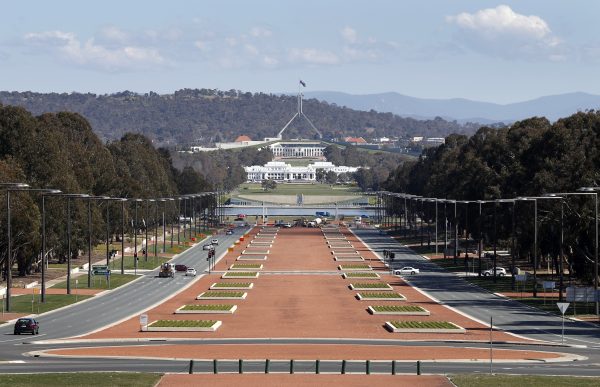In the lead up to calling the election, national security and China have been used by the government to try to wedge the Labor opposition and have become contentious issues, alongside economic, financial and health recovery from the COVID-19 pandemic. Foreign policy rarely plays a prominent role in Australian elections and the Labor opposition has tried to keep it that way.
The Australia–China relationship has hit what many thought was rock bottom a number of times but continues to worsen. Chinese assertiveness and trade coercion has solidified Australia’s resolve and partners in the region have rhetorically supported Australia. But most of the region continues to manage relations with China more productively and with less rancour.
Australia’s foreign policy posture has changed markedly in the past half decade, with security fears coming to dominate its huge positive economic relationship with China. After searching to define its future in Asia, Australia has turned again to seek security from Asia. This shift has also seen Australia’s standing in the region sharply slide.
The US alliance underpins Australia’s national security arrangements and is deeply locked in. The alliance relationship is not the end but the means to a more secure and prosperous Australia. The alliance relationship should give Australia the confidence and foundation from which to engage the region.
The Australia–United Kingdom–United States (AUKUS) arrangement is the West’s ‘no limits’ partnership but Australia’s proposed new nuclear submarine fleet that is at the centre of it will not materialise for another two decades if ever, and Australia’s subsidiarisation of its security strategy to as yet undefined American security goals is its looming consequence. A bumble-footed Biden administration may be a worry, but a bigger underlying worry is that Trump or a Trump-surrogate is likely to be elected in 2024 and a red wave is expected to wash over the United States in the midterms later this year.
The Quad has been a useful mechanism to engage the United States and India, together with Japan, on the basis of their mutual anxieties about Chinese power. But to what effective purpose is not yet entirely clear. Sustaining it will require improving on its delivery of the public goods, beyond security firepower, that the region needs.
Many think Australia’s influence in Washington has been elevated by leading the charge against China, but the payoff, in terms of economic or security protection, is difficult to discern. Building what is called integrated deterrence across the United States’ hub-and-spokes security arrangements and partnerships in the Indo-Pacific is one declared objective but the region has little appetite for a framework that excludes economic engagement with China, its major trading partner. While Australia still has chips on the table with China through participation in ASEAN’s Regional Comprehensive Economic Partnership (RCEP) agreement, it has articulated its overarching foreign and security policy goals in the Indo-Pacific in a way that threatens the region’s economic engagement with China, steadily alienating it from its regional neighbours.
In the first of our three feature articles this week on Australia’s election and foreign policy, Sam Roggeveen points out that Morrison’s ‘arc of autocracy’ framing is an ideological appeal that pits Australia as a member of the free and democratic West against a group of dictators led by China and Russia, which may situate the government to wedge the Australian Labor Party opposition on its perceived security weakness, but resonates little across the rest of Asia, with the cautious exception perhaps of Japan.
As Charlie Barnes explains in this week’s second feature article, the Department of Foreign Affairs and Trade (DFAT) has largely been absent in reshaping Australia’s new foreign policy stance. The Morrison Government ‘turns to the National Security Committee (NSC) of Cabinet on foreign policy matters. While submissions to the NSC are discussed by Ministers and officials from all relevant departments and agencies, including DFAT, the Foreign Minister has struggled to make her voice heard and DFAT’s concerns have been subservient to the security agencies’. Under his government, and this Foreign Minister, diplomatic considerations have been overlooked to the detriment of Australia’s relations with key strategic partners in the region and beyond. It is unclear, for example, when Australia’s ambassadors to Paris or Jakarta were told of the AUKUS agreement, let alone if they were consulted in the lead up to the deal’.
There will likely be a rhetorical hardening of Australia’s foreign policy during the current election campaign, as Barnes suggests, as the government attempts to paint Labor as soft on China and security issues and Labor tries to neutralise the issue, even if a ‘khaki election’ does not eventuate.
With successive budget cuts to foreign affairs, soaring appropriations to security and defence agencies and a foreign minister and department with little voice in shaping national foreign policy strategy, it’s no wonder that the region is confused as to why Australia has kept provoking China’s insecurity and volatility.
In our third feature this week, Tom Westland observes that policy substance is missing in Australian election action but that ‘policy somnambulism is most evident, though, in an area that rarely attracts attention by either the Australian media or voters: foreign policy’.
‘Practically speaking’, Westland argues, ‘the most important step Australia could take towards building a deeper diplomatic engagement with ASEAN would be to help put meat on the bones of the Regional Comprehensive Economic Partnership (RCEP) agreement’.
Whichever party wins next month, Australia needs a national strategy that must in the end take account of how Asia views the contest between big powers in the region and engages China, not one completely overwhelmed by management of its alliance relationship with Washington.
The EAF Editorial Board is located in the Crawford School of Public Policy, College of Asia and the Pacific, The Australian National University.

